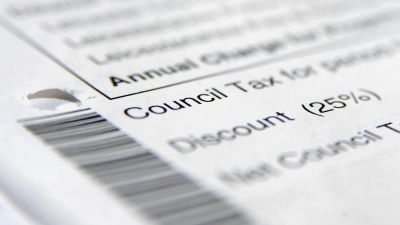Council tax looks set to rise in Dumfries and Galloway and area counts financial cost of Covid-19

A council tax hike and service cuts look likely at Dumfries and Galloway Council over the coming months due to a funding shortfall from the Scottish Government.
The local authority was already facing an estimated £12.8m funding gap for 2022/23, but the council has received £3.7m less than expected in its settlement from Holyrood.
In addition, it has been revealed that the cost of the pandemic to the council over the past six months has been over £5.7m.
The situation regarding the funding gap has been laid bare in a report by council finance and accounting manager Gillian Ross, which is to be tabled at the council's finance committee next week.
She wrote: "There had been optimism that the funding settlement may be less challenging than previously anticipated.
"Unfortunately, this has not been the case and, taking into account both the impact of the additional policy commitments/requirements and the impact of distributional movements, DGC's 'like for like' cash funding for 2022/23 has been reduced by an estimated £3.768m."
Before the funding allocation was made to the council, finance officers had already been looking at various ways to balance the books for this year's budget.
They calculated that a three percent increase in council tax would bring the £12.8 funding gap down to £10.6m.
Now, with various factors involved including staff pay increases and the unexpected reduction in funding, the latest calculations see the council £11.7m in the red.
This is before any council tax increase is set, or other cost-cutting options are drawn up.
The 2022/23 funding settlement from the government reflects an increase of £751.3m for all 32 Scottish councils against 2021/22 levels (excluding Covid funding).
Council chiefs say though that this figure includes £803.4m specifically to support additional commitments in education and health and social care, such as provding more teachers, and adult social care pay.
When the overall numbers were broken down by Dumfries and Galloway finance officers, this region has fared worse than before.
The council report states: "Due to the impact of the distribution formula, largely associated with a reduction in the council's share of education funding, the level of funding reduction applied to Dumfries and Galloway Council is higher at 1.19 percent - which equates to the decrease in support of £3.768m.
"The settlement also does not provide any funding for pay increases for local government workers, or for non-pay inflation (e.g. energy, fuel, food price increases) that councils will inevitably face.
"Cosla [Convention of Scottish local Authorities] has therefore indicated that the settlement reflects a £371m (3.5%) real terms funding reduction."
If council tax levels were to rise as expected, council finance officers underlined that this money only contributes to less than 18 percent of the local authority's income.
Scottish Finance Secretary Kate Forbes said: "The 2022/23 Budget confirms that, even in the face of the economic uncertainty caused by the pandemic, we are providing councils with a real terms increase to their budgets for the coming year of more than five percent.
"I have been clear that this budget has required difficult choices. But I am determined that councils should be fairly funded within the limited resources we have available."
Meanwhile, all council leaders from Scotland's 32 local authorities sent a joint letter to First Minister Nicola Sturgeon and Ms Forbes last month expressing "deep concern" about the budget cuts.
They wrote: "Yet again, this settlement demonstrates that Scottish Government is not giving local government the respect it deserves and is showing complete disregard for local government's role as a key partner in achieving better outcomes for the people of Scotland."
Finance chiefs have also calculated Covid-related unbudgeted expenditure, along with huge reductions in income due to restrictions, in a new report.
Some of the extra costs include: staff redeployment - £1.1m; PPE/sanitisers/additional cleaning - £750,000; and higher energy bills following increased ventilation in schools etc - £600,000.
Meanwhile, enforced restrictions have resulted in a £2.5m reduction in income from sources including letting, leisure services, burials and community facilities.
The council report explains: "This estimate reflects the net income loss associated with the closure of leisure facilities at the beginning of the financial year and the ongoing impact associated with the significant reduction in both capacity and footfall in our leisure and sport facilities across the region.
"While it had been anticipated that income levels would begin to increase over the latter part of the financial year, the ongoing restrictions and increased infection rates have continued to impact on the level of income generated.
"The potential ongoing pressures and implications associated with this extended reduction in income levels is currently subject to review with the service."
However, the overall £5.7m additional costs have been offset by nearly £2.5m in savings made related to the Covid situation.
Savings on fuel and travel costs have totalled £152,000, property, supplies and services costs - £500,000, while non-domestic rates relief have saved the council around £1.82m.